高校英语专业四级考试词汇语法详解
- 格式:docx
- 大小:12.48 KB
- 文档页数:2
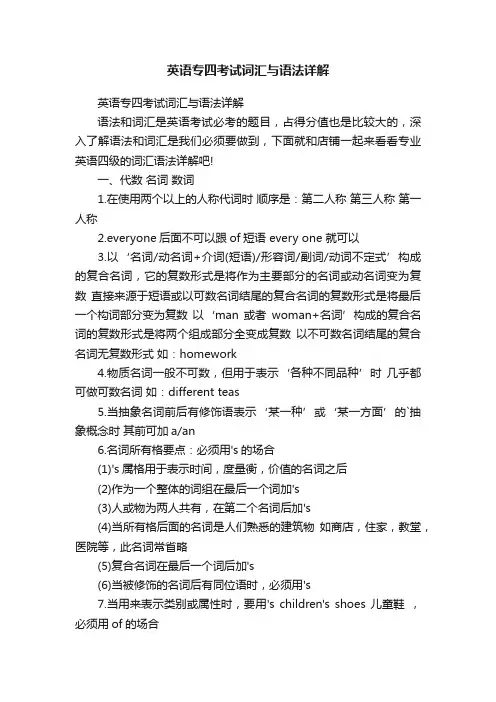
英语专四考试词汇与语法详解英语专四考试词汇与语法详解语法和词汇是英语考试必考的题目,占得分值也是比较大的,深入了解语法和词汇是我们必须要做到,下面就和店铺一起来看看专业英语四级的词汇语法详解吧!一、代数名词数词1.在使用两个以上的人称代词时顺序是:第二人称第三人称第一人称2.everyone后面不可以跟of短语 every one 就可以3.以‘名词/动名词+介词(短语)/形容词/副词/动词不定式’构成的复合名词,它的复数形式是将作为主要部分的名词或动名词变为复数直接来源于短语或以可数名词结尾的复合名词的复数形式是将最后一个构词部分变为复数以‘man 或者woman+名词’构成的复合名词的复数形式是将两个组成部分全变成复数以不可数名词结尾的复合名词无复数形式如:homework4.物质名词一般不可数,但用于表示‘各种不同品种’时几乎都可做可数名词如:different teas5.当抽象名词前后有修饰语表示‘某一种’或‘某一方面’的`抽象概念时其前可加a/an6.名词所有格要点:必须用's的场合(1)'s属格用于表示时间,度量衡,价值的名词之后(2)作为一个整体的词组在最后一个词加's(3)人或物为两人共有,在第二个名词后加's(4)当所有格后面的名词是人们熟悉的建筑物如商店,住家,教堂,医院等,此名词常省略(5)复合名词在最后一个词后加's(6)当被修饰的名词后有同位语时,必须用's7.当用来表示类别或属性时,要用's children's shoes 儿童鞋,必须用of的场合(1)名词后跟有后置修饰语或同位语时(2)以定冠词加分词或形容词表示一类人时如果dozen/score/hundred/thousand/million前有基数词以表示确切数目时,都不能用复数形式如果用来表示很多有不确切的数目时,须用复数,而且后面加of8.表示顺序的两种方式:(1)'名词+基数词',不用冠词,如Chapter four(2)' the+序数词+名词' 如the Fourth Chapter9.倍数增减的表示法(1) 倍数+形容词/副词比较级+than(2) 倍数+as+形容词/副词+as(3) 倍数+名词(4) 动词+百分比或倍数(5) 动词+to+数词(6) double/triple/quadruple+名词(7) 动词+by+数词/百分比/倍数10.分数分子为基数词,分母为序数词分母除了在分子为一的其他情况下为复数11.百分比后接名词时加of二、形容词副词(1)前置修饰语的排列顺序可以至于冠词前的形容词(all both such) -----冠词,指示形容词,所有格形容词,不定形容词(a an the this your his any some)-----------基数词(one ) 序数词(first)------------ 表示性质,状态,质量的形容词(good useful)--------------表示大小,长短,形状的形容词----------------表示年龄,新旧,温度的形容词------------表示颜色的形容词---------------------表示国籍,产地,区域的形容词-----------表示材料,用做形容词的名词----------动名词,分词(2)后置修饰语由前缀a-构成的形容词(3)形容词修饰由some-,any-,every-,no-,-body,-one,-thing等组成的复合不定代词时,必须后置(4)enough作形容词修饰名词时既可放前又可放后,但当它作副词修饰形容词或副词时,必须后置(5)有些形容词本身就有’比…年长‘,’比…… 优等的意思这些形容词后面用介词to 而不用than(6)much too 作为副词短语修饰形容词或副词,不修饰名词(7)more 不能用来修饰比较级(8)与名词连用的more of a …/as much of a…/more of a…意为更像…(9)as much o f a…意为称得上,less of a 意为算不上(10)none other than(不是别人,正是)=no other than(11)any/some/every与other连用时,其后若用可数名词,一般为单数三、情态动词(1)can 用于否定句cannot(help)but表示不能不,只能(but后跟不带to的动词不定式)(2)must 表示禁止,一定不要时的否定式为mustn't 当它表示有把握的推断时意为一定准是时它的否定形式为can't(3)need doing=need to be done 这个句型表示被动意味(4)need not have done sth 表示本来没有必要做某事 (经常考)四、虚拟语气从句主句(1)与过去事实相反 had+过去分词 should(第一人称)would(其它人称)+have+过去分词与现在事实相反一般过去式(动词be用were) would/should/could/might+动词原型与将来事实相反过去式或should/were+动原would/should/could/might+动词原型(2)It is (high/about/the)time……谓语动词用过去式指现在或将来的情况表示早该做某事而现在已经有点晚了(3)It is the first(second/third)time后的that从句中,谓语动词要用完成体来表示一种经验(4)as if/though 的虚拟要点(5)对当时事实的假设,从句谓语用过去式,be动词一律用were(6)对过去事实的假设,从句谓语用过去完成式(7)对未来事实的假设,从句谓语用would+动词原型【英语专四考试词汇与语法详解】。
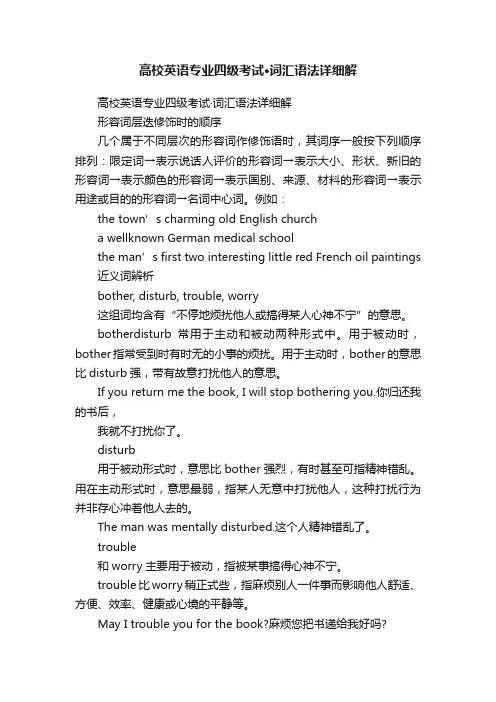
高校英语专业四级考试·词汇语法详细解高校英语专业四级考试·词汇语法详细解形容词层迭修饰时的顺序几个属于不同层次的形容词作修饰语时,其词序一般按下列顺序排列:限定词→表示说话人评价的形容词→表示大小、形状、新旧的形容词→表示颜色的形容词→表示国别、来源、材料的形容词→表示用途或目的的形容词→名词中心词。
例如:the town’s charming old English churcha wellknown German medical schoolthe man’s first two interesting little red French oil paintings 近义词辨析bother, disturb, trouble, worry这组词均含有“不停地烦扰他人或搞得某人心神不宁”的意思。
botherdisturb常用于主动和被动两种形式中。
用于被动时,bother指常受到时有时无的小事的烦扰。
用于主动时,bother的意思比disturb强,带有故意打扰他人的意思。
If you return me the book, I will stop bothering you.你归还我的书后,我就不打扰你了。
disturb用于被动形式时,意思比bother强烈,有时甚至可指精神错乱。
用在主动形式时,意思最弱,指某人无意中打扰他人,这种打扰行为并非存心冲着他人去的。
The man was mentally disturbed.这个人精神错乱了。
trouble和worry主要用于被动,指被某事搞得心神不宁。
trouble比worry稍正式些,指麻烦别人一件事而影响他人舒适、方便、效率、健康或心境的平静等。
May I trouble you for the book?麻烦您把书递给我好吗?worry主要指因对某事的结果没有把握而焦虑不安,还可指某人沉浸在软弱无助的情绪或思虑中。
Worrying about your health can make you sick.经常担心你的健康,会使你生病的。
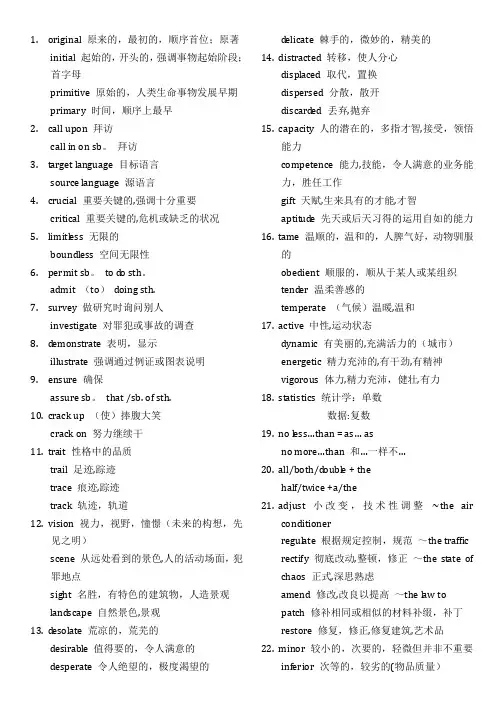
1.original 原来的,最初的,顺序首位;原著initial 起始的,开头的,强调事物起始阶段;首字母primitive 原始的,人类生命事物发展早期primary 时间,顺序上最早2.call upon 拜访call in on sb。
拜访3.target language 目标语言source language 源语言4.crucial 重要关键的,强调十分重要critical 重要关键的,危机或缺乏的状况5.limitl ess 无限的boundl ess 空间无限性6.permit sb。
to d o sth。
admit (to)d oing sth.7.survey 做研究时询问别人investigate 对罪犯或事故的调查8.d emonstrate 表明,显示illustrate 强调通过例证或图表说明9.ensure 确保assure sb。
that /sb. of sth.10.crack up (使)捧腹大笑crack on 努力继续干11.trait 性格中的品质trail 足迹,踪迹trace 痕迹,踪迹track 轨迹,轨道12.vision 视力,视野,憧憬(未来的构想,先见之明)scene 从远处看到的景色,人的活动场面,犯罪地点sight 名胜,有特色的建筑物,人造景观landscape 自然景色,景观13.d esolate 荒凉的,荒芜的d esirable 值得要的,令人满意的d esperate 令人绝望的,极度渴望的d elicate 棘手的,微妙的,精美的14.distracted 转移,使人分心displaced 取代,置换dispersed 分散,散开discard ed 丢弃,抛弃15.capacity 人的潜在的,多指才智,接受,领悟能力competence 能力,技能,令人满意的业务能力,胜任工作gift 天赋,生来具有的才能,才智aptitud e 先天或后天习得的运用自如的能力16.tame 温顺的,温和的,人脾气好,动物驯服的obedient 顺服的,顺从于某人或某组织tend er 温柔善感的temperate (气候)温暖,温和17.active 中性,运动状态dynamic 有美丽的,充满活力的(城市)energetic 精力充沛的,有干劲,有精神vigorous 体力,精力充沛,健壮,有力18.statistics 统计学:单数数据:复数19.no less…than = as… asno more…than 和…一样不…20.all/both/d oubl e + thehalf/twice +a/the21.adjust 小改变,技术性调整~the airconditionerregulate 根据规定控制,规范~the trafficrectify 彻底改动,整顿,修正~the state of chaos 正式,深思熟虑amend 修改,改良以提高~the law topatch 修补相同或相似的材料补缀,补丁restore 修复,修正,修复建筑,艺术品22.minor 较小的,次要的,轻微但并非不重要inferior 次等的,较劣的(物品质量)secondary 重要性或顺序上的第二位subordinate 从属,下级的,强调主次地位23.bounce (球)反弹,(人)蹦跳bound 跳跃,(弹性,轻捷,优美)hop 单脚跳l eap 飞跃,跃进make a great ~24.chaos 极度杂乱,完全混乱disord er 缺乏整齐,顺序in ~mess 十分肮脏,不整齐in a ~riot 暴乱in the ~s25.ban 官方禁止forbid 普通用语,要求遵守veto 国王,总统否决法案boycott 联合抵制,拒买*26.accuse ~sb。
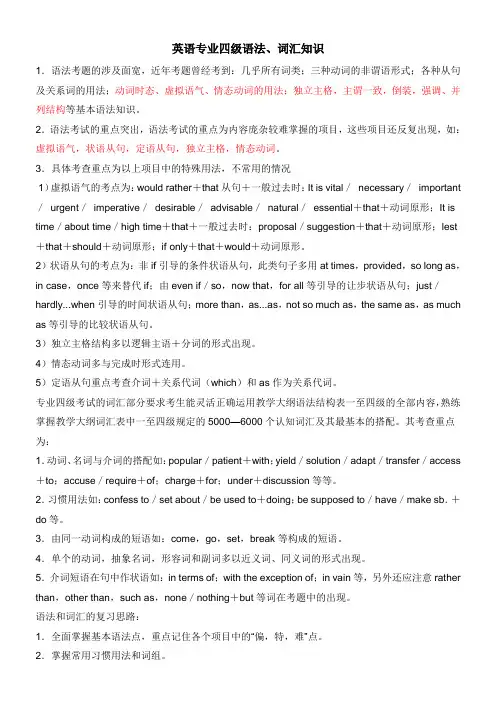
英语专业四级语法、词汇知识1.语法考题的涉及面宽,近年考题曾经考到:几乎所有词类;三种动词的非谓语形式;各种从句及关系词的用法;动词时态、虚拟语气、情态动词的用法;独立主格,主谓一致,倒装,强调、并列结构等基本语法知识。
2.语法考试的重点突出,语法考试的重点为内容庞杂较难掌握的项目,这些项目还反复出现,如:虚拟语气,状语从句,定语从句,独立主格,情态动词。
3.具体考查重点为以上项目中的特殊用法,不常用的情况1)虚拟语气的考点为:would rather+that从句+一般过去时:It is vital/necessary/important /urgent/imperative/desirable/advisable/natural/essential+that+动词原形;It is time/about time/high time+that+一般过去时:proposal/suggestion+that+动词原形;lest +that+should+动词原形;if only+that+would+动词原形。
2)状语从句的考点为:非if引导的条件状语从句,此类句子多用at times,provided,so long as,in case,once等来替代if;由even if/so,now that,for all等引导的让步状语从句;just/hardly...when引导的时间状语从句;more than,as...as,not so much as,the same as,as much as等引导的比较状语从句。
3)独立主格结构多以逻辑主语+分词的形式出现。
4)情态动词多与完成时形式连用。
5)定语从句重点考查介词+关系代词(which)和as作为关系代词。
专业四级考试的词汇部分要求考生能灵活正确运用教学大纲语法结构表一至四级的全部内容,熟练掌握教学大纲词汇表中一至四级规定的5000—6000个认知词汇及其最基本的搭配。
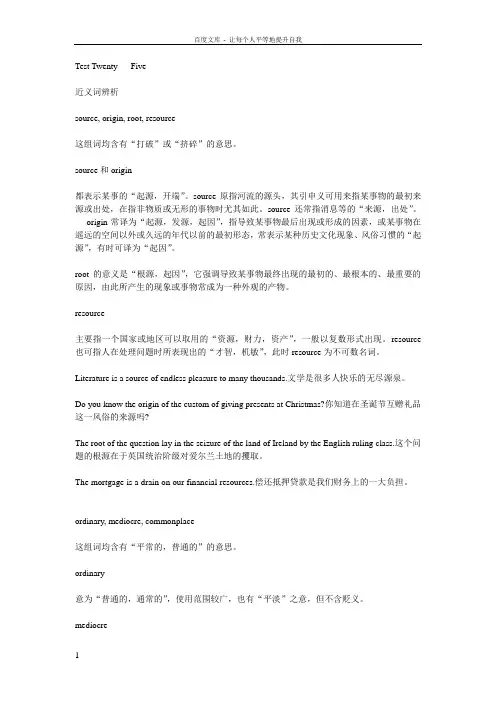
Test Twenty Five近义词辨析source, origin, root, resource这组词均含有“打破”或“挤碎”的意思。
source和origin都表示某事的“起源,开端”。
source原指河流的源头,其引申义可用来指某事物的最初来源或出处,在指非物质或无形的事物时尤其如此。
source还常指消息等的“来源,出处”。
origin常译为“起源,发源,起因”,指导致某事物最后出现或形成的因素,或某事物在遥远的空间以外或久远的年代以前的最初形态,常表示某种历史文化现象、风俗习惯的“起源”,有时可译为“起因”。
root的意义是“根源,起因”,它强调导致某事物最终出现的最初的、最根本的、最重要的原因,由此所产生的现象或事物常成为一种外观的产物。
resource主要指一个国家或地区可以取用的“资源,财力,资产”,一般以复数形式出现。
resource 也可指人在处理问题时所表现出的“才智,机敏”,此时resource为不可数名词。
Literature is a source of endless pleasure to many thousands.文学是很多人快乐的无尽源泉。
Do you know the origin of the custom of giving presents at Christmas?你知道在圣诞节互赠礼品这一风俗的来源吗?The root of the question lay in the seizure of the land of Ireland by the English ruling class.这个问题的根源在于英国统治阶级对爱尔兰土地的攫取。
The mortgage is a drain on our financial resources.偿还抵押贷款是我们财务上的一大负担。
ordinary, mediocre, commonplace这组词均含有“平常的,普通的”的意思。
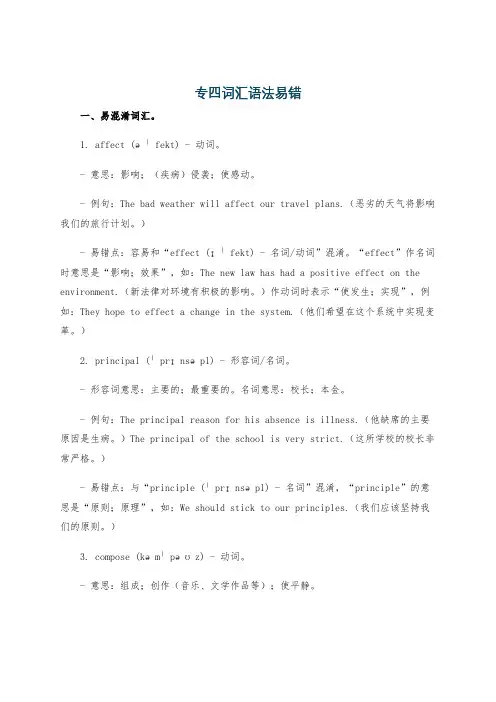
专四词汇语法易错一、易混淆词汇。
1. affect (əˈfekt) - 动词。
- 意思:影响;(疾病)侵袭;使感动。
- 例句:The bad weather will affect our travel plans.(恶劣的天气将影响我们的旅行计划。
)- 易错点:容易和“effect (ɪˈfekt) - 名词/动词”混淆。
“effect”作名词时意思是“影响;效果”,如:The new law has had a positive effect on the environment.(新法律对环境有积极的影响。
)作动词时表示“使发生;实现”,例如:They hope to effect a change in the system.(他们希望在这个系统中实现变革。
)2. principal (ˈprɪnsəpl) - 形容词/名词。
- 形容词意思:主要的;最重要的。
名词意思:校长;本金。
- 例句:The principal reason for his absence is illness.(他缺席的主要原因是生病。
)The principal of the school is very strict.(这所学校的校长非常严格。
)- 易错点:与“principle (ˈprɪnsəpl) - 名词”混淆,“principle”的意思是“原则;原理”,如:We should stick to our principles.(我们应该坚持我们的原则。
)3. compose (kəmˈpəʊz) - 动词。
- 意思:组成;创作(音乐、文学作品等);使平静。
- 例句:Water is composed of hydrogen and oxygen.(水由氢和氧组成。
)He can compose beautiful music.(他能创作优美的音乐。
)- 易错点:容易和“comprise (kəmˈpraɪz) - 动词”弄混。
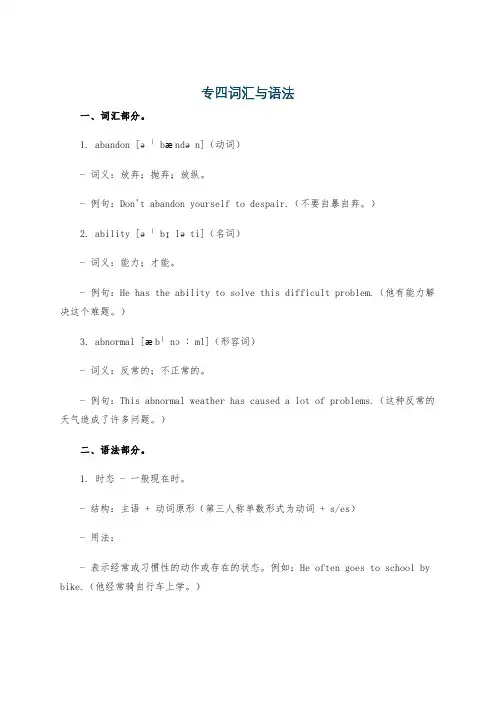
专四词汇与语法一、词汇部分。
1. abandon [əˈbændən](动词)- 词义:放弃;抛弃;放纵。
- 例句:Don't abandon yourself to despair.(不要自暴自弃。
)2. ability [əˈbɪləti](名词)- 词义:能力;才能。
- 例句:He has the ability to solve this difficult problem.(他有能力解决这个难题。
)3. abnormal [æbˈnɔːml](形容词)- 词义:反常的;不正常的。
- 例句:This abnormal weather has caused a lot of problems.(这种反常的天气造成了许多问题。
)二、语法部分。
1. 时态 - 一般现在时。
- 结构:主语 + 动词原形(第三人称单数形式为动词 + s/es)- 用法:- 表示经常或习惯性的动作或存在的状态。
例如:He often goes to school by bike.(他经常骑自行车上学。
)- 表示客观事实或普遍真理。
例如:The earth moves around the sun.(地球绕着太阳转。
)2. 名词的数 - 可数名词复数形式。
- 规则变化:- 一般情况加 -s,如book - books。
- 以s, x, ch, sh结尾的加 -es,如box - boxes。
- 以辅音字母 + y结尾的,变y为i加 -es,如city - cities。
- 不规则变化:- 如man - men,woman - women,child - children等。
3. 形容词和副词的比较级和最高级。
- 规则变化:- 单音节词和部分双音节词:- 一般情况加 -er(比较级)和 -est(最高级),如tall - taller - tallest。
- 以e结尾的加 -r和 -st,如nice - nicer - nicest。
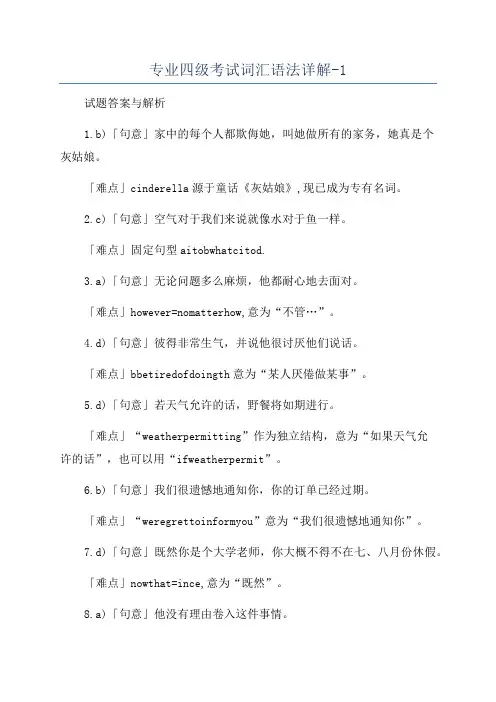
专业四级考试词汇语法详解-1试题答案与解析1.b)「句意」家中的每个人都欺侮她,叫她做所有的家务,她真是个灰姑娘。
「难点」cinderella源于童话《灰姑娘》,现已成为专有名词。
2.c)「句意」空气对于我们来说就像水对于鱼一样。
「难点」固定句型aitobwhatcitod.3.a)「句意」无论问题多么麻烦,他都耐心地去面对。
「难点」however=nomatterhow,意为“不管…”。
4.d)「句意」彼得非常生气,并说他很讨厌他们说话。
「难点」bbetiredofdoingth意为“某人厌倦做某事”。
5.d)「句意」若天气允许的话,野餐将如期进行。
「难点」“weatherpermitting”作为独立结构,意为“如果天气允许的话”,也可以用“ifweatherpermit”。
6.b)「句意」我们很遗憾地通知你,你的订单已经过期。
「难点」“weregrettoinformyou”意为“我们很遗憾地通知你”。
7.d)「句意」既然你是个大学老师,你大概不得不在七、八月份休假。
「难点」nowthat=ince,意为“既然”。
8.a)「句意」他没有理由卷入这件事情。
「难点」getting为get的现在分词形式,与mi某edup构成现在分词短语,修饰buine,作定语。
9.b)「句意」每个人都要遵守规则,主任也不例外。
「难点」but=e某cept,notbut意为“不除……之外”。
10.a)「句意」岩石的纹理结构被描述为“像糖”。
「难点」bedecribeda意为“被形容为”。
11.a)「句意」儿童饿死这一话题太无情,不该拿来开玩笑。
「难点」grim意为“无情的,冷酷的,可怕的”;grief是名词,意为“悲伤,悲痛”;hre wd意为“机灵的,精明的”;nobbih意为“势力的,媚上欺下的”。
12.c)「句意」我们不能对这些反对意见不予理睬。
「难点」hrugoff意为“对…满不在乎,对…不屑一顾”;wardoff意为“避开,挡开,避免”;layoff意为“停止打扰;不理会;戒绝”;hakeoff意为“抖落,摆脱”。
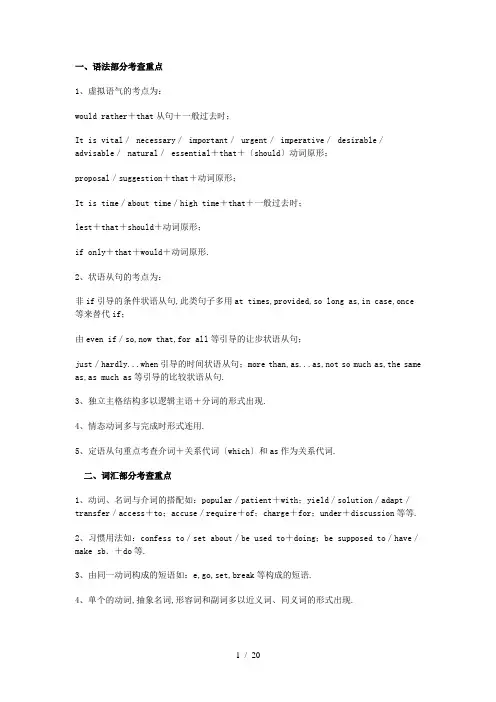
一、语法部分考查重点1、虚拟语气的考点为:would rather+that从句+一般过去时;It is vital/ necessary/ important/ urgent/ imperative/ desirable/advisable/ natural/ essential+that+〔should〕动词原形;proposal/suggestion+that+动词原形;It is time/about time/high time+that+一般过去时;lest+that+should+动词原形;if only+that+would+动词原形.2、状语从句的考点为:非if引导的条件状语从句,此类句子多用at times,provided,so long as,in case,once等来替代if;由even if/so,now that,for all等引导的让步状语从句;just/hardly...when引导的时间状语从句;more than,as...as,not so much as,the same as,as much as等引导的比较状语从句.3、独立主格结构多以逻辑主语+分词的形式出现.4、情态动词多与完成时形式连用.5、定语从句重点考查介词+关系代词〔which〕和as作为关系代词.二、词汇部分考查重点1、动词、名词与介词的搭配如:popular/patient+with;yield/solution/adapt/transfer/access+to;accuse/require+of;charge+for;under+discussion等等.2、习惯用法如:confess to/set about/be used to+doing;be supposed to/have/make sb.+do等.3、由同一动词构成的短语如:e,go,set,break等构成的短语.4、单个的动词,抽象名词,形容词和副词多以近义词、同义词的形式出现.5、介词短语在句中作状语如:in terms of;with the exception of;in vain等,另外还应注意rather than,other than,such as,none/nothing+but等词在考题中的出现.三、专四重要词组1.abide by<=be faithful to ; obey>忠于;遵守.2. be absent from…. 缺席,不在3. absence of mind<=being absent-minded> 心不在焉4. absorb<=take up the attention of>吸引…的注意力<被动语态>be absorbed i n 全神贯注于…近be engrossed in ; be lost in ; be rapt in ;be concentrated on ; be focused on ; be centered on5. <be> abundant in<be rich in; be well supplied with> 富于,富有6. access<to> <不可数名词> 能接近,进入,了解7. by accident<=by chance, accidentally>偶然地,意外. Without accident<=safely> 安全地,8. of one’s own accord<=without being asked; willingly; freely>自愿地 ,主动地9. in accord with 与…一致. out of one’s accord with 同….不一致10. with one accord <=with everybody agreeing>一致地11. in accordance with <=in agreement with> 依照,根据12. on one’s own account 1> 为了某人的缘故, 为了某人自己的利益2> <=at one’s own risk> 自行负责 3> <=by oneself>依靠自己 on account 赊账; on account of 因为; on no account不论什么原因也不;of …account 有…..重要性.13. take…into account<=consider>把...考虑进去14. give sb. an account of 说明, 解释 <理由>15. account for <=give an explanation or reason for> 解释, 说明.16. on account of <=because of> 由于,因为.17. on no account<=in no case, for no reason>绝不要,无论如何不要<放句首时句子要倒装>18. accuse…of…<=charge…with; blame sb. for sth. ; blame sth. on sb. ; plain about> 指控,控告19. be accustomed to <=be in the habit of, be used to>习惯于.20. be acquainted with<=to have knowledge of> 了解; <=to have met socially > 熟悉21. act on 奉行,按照…行动; act as 扮演; act for 代理22. adapt oneself to<=adjust oneself to> 使自己适应于23. adapt…<for> <=make sth. Suitable for a new need> 改编, 改写<以适应新的需要>24. in addition <=besides> 此外, 又, 加之25. in addition to<=as well as, besides, other than>除…外26. adhere to <=abide by, conform to, ply with, cling to, insist on, pe rsist in, observe, opinion, belief > 粘附; 坚持, 遵循27. adjacent<=next to, close to> 毗邻的, 临近的28. adjust..<to> <=change slightly>调节; 适应;29. admit of <=be capable of, leave room for> …的可能,留有…的余地.30. in advance <before in time> 预告, 事先.31. to advantage 有利的,使优点更加突出地.32. have an advantage over 胜过. have the advantage of 由于…处于有利条件 have the advantage of sb.知道某人所不知道的事33. take advantage of <=make the best of, utilize, make use of, profit from, harness>利用.34. agree with 赞同<某人意见> agree to 同意35. in agreement <with> 同意, 一致36. ahead of 在…之前, 超过…;……………. ahead of time 提前.37. in the air 1>不肯定, 不具体. 2>在谣传中.38. above all <=especially, most important of all> 尤其是, 最重要的.39. in all <=counting everyone or everything, altogether> 总共, 总计40. after all 毕竟,到底; <not> at all 一点也不; all at once<=suddenly>突然; once and for all 只此一次; above all 最重要的; first of all 首先; all in all 大体上说; be all in 累极了; all but 几乎.41. allow for <=take into consideration, take into account> 考虑到, 估计到 .42. amount to <=to be equal to> 总计, 等于.43. answer for <undertake responsibility for, be liable for, take charge for> 对…负责.44. answer to <=conform to> 适合,符合.45. be anxious about 为…焦急不安; 或anxious for46. apologize to sb. for sth. 为…向…道歉47. appeal to sb. for sth. 为某事向某人呼吁. appeal to sb. 对某人有吸引力48. apply to sb. for sth. 为…向…申请 ; apply for申请; apply to 适用.49. apply to 与…有关;适用50. approve of <=consent to, be in favor of, favor, agree to, consider good, right> 赞成, approve vt. 批准51. arise from<=be caused by> 由…引起.52. arrange for sb.sth. to do sth. 安排…做…53. arrive on 到达; arrive at 到达某地<小地方>;得出,作出; arrive in 到达某地<大地方>;54. be ashamed of <=feel shame, guilt or sorrow because of sth. done> 以… 为羞耻55. assure sb. of sth. <=try to cause to believe or trust in sth.> 向…保证, 使…确信.56. attach<to> <=to fix, fasten; join> 缚, 系 ,结57. make an attempt at doing sth. <to do sth.> 试图做…58. attend to <=give one’s attention, care and thought>注意,照顾;attendon<upon><=wait upon, serve, look after> 侍候,照料59. attitude to toward …对…的态度.看法60. attribute…to…<=to believe sth. to be the result of…>把..归因于.., 认为..是..的结果61. on the average <=on average, on an average> 平均62. <be> aware of <=be conscious of , having knowledge or consciousness>意识到,知道.63. at the back of <=behind> 在…后面64. in the back of 在…后部<里面>; on the back of 在…后部<外面>; be on one’s back<=be ill in bed> 卧病不起.65. at one’s back<=supporting or favoring sb.> 支持,维护; have sb. at one ’s back 有…支持, 有…作后台66. turn one’s back on sb. <=turn away from sb. in an impolite way> 不理睬<某人>,背弃,抛弃67. behind one’s back 背着某人<说坏话>68. be based on upon 基于69. on the basis of 根据…, 在…基础上70. beat…at 在…运动项目上打赢71. begin with 以…开始. to begin with <=first of all> 首先, 第一<经常用于开始语>72. on behalf of <=as the representative of> 以…名义73. believe in<=have faith or trust in; consider sth.sb. to be true> 相信,依赖,信仰.74. benefit <from> 受益,得到好处.75. for the benefit of 为了…的利益<好处>76. for the better 好转77. get the better of <=defeat sb.> 打败, 胜过.78. by birth 在出生上,论出身,按血统 at birth 在出生时; give birth to 出生79. blame sb. for sth. 因…责备某人 . blame sth. on sb. 把…推在某人身上80. in blossom开花<指树木> be in blossom开花<强调状态> e into blossom开花<强调动作>81. on board 到船上, 在船上, 上火车或飞机82. boast of <or about> 吹嘘83. out of breath 喘不过气来84. in brief<=in as few words as possible>简言之85. in bulk 成批地,不散装的86. take the floor 起立发言87. on business 出差办事.88. be busy with sth.于某事 . be busy doing sth. 忙于做某事89. last but one 倒数第二.90. but for <=without> 要不是. 表示假设91. buy sth. for…money 用多少钱买92. be capable of 能够, 有能力 be capable of being +过去分词是能够被…的93. in any case<=for love or money, at any rate, at any price, at any cost , whatever happens; anyhow>无论如何94. in case <=for fear that> 万一;95. in case of <=in the event of>如果发生…万一 in the case of 至于…, 就…而言96. in no case在任何情况下都不<放句首倒装句>97. be cautious of 谨防98. center one’s attention on<=focus one’s attention on> 把某人的注意力集中在…上99. be certain of <=be sure of> 有把握, 一定.100. for certain of <=for sure >肯定地,有把握地101. by chance<=accidentally, by accident>偶然102. for a change换换环境<花样等>103. charge sb. with …控告某人犯有…104. in charge of <=responsible for> 负责<某事> in the charge of …由…管105. take charge of <=to be or bee responsible for>负责管理<照顾>106. charge…for 因…索取<费用> , charge sb. with sth. 控告某人犯有…107. round the clock<=all day and all night, usually without stopping> 昼夜不停地108. ment on 评论109. mit oneself to 使自己承担… mit sb. to prison把某人送进监狱; mit one’s idea to writing 把某人的想法写下来; mit a matter to a mittee 把某事交给委员会讨论110. in mon <和…>有共同之处,共用. be mon to sb. 是与某人所共有的111. keep pany with <=be friendly and go out together> 和…要好.112. pare…with … 把…与…比较113. pare…to… 把…比作…114. by parison 比较起来115. in parison with <=in contrast to> 和…比起来116. pensate for <=give sth. to make up for> 补偿, 赔偿,弥补 pensate sb. for sth. 赔偿,弥补117. plain of <or about>抱怨;诉苦;控告;plain about 抱怨某人或事情; plain to sb. about sth. <or sb.> 向某人抱怨…; plain <抱怨>; plement <补充>; pliment <恭维> 118. ply with <=act in accordance with a demand, order, rule etc.> 遵守, 依从119. conceive of <think of, imagine, consider> 想象,设想120. concentrate on <or upon> 集中,专心121. be concerned with <=about> 与…有关122. concern oneself about with 关心123. in conclusion<=as the last thing>最后一点; at the conclusion of 当…结束时; 124. condemn sb. to 判决125. on condition that <=if>以…为条件, 假如. in that = because因为; now that = since既然 for all that = although 尽管126. in out of condition <=thoroughly healthy or fit not fit> 健康状况好不好 . in good <bad> condition处于良好<坏>状态127. confess<to><=admit a fault, crime, or sth. wrong>承认, 供认; confess to a crime 承认罪行.128. confide in <=to talk freely to sb. about one’s secret> 对…讲真心话, 依赖129. in confidence 推心置腹地; with confidence 满怀信心地; have confidence in 对…有信心130. confidence in sb. sth. 对…的信赖131. be confident of 有信心; confidential ##的132. confine…to… 把…限制在某范围内133. confirm sb. in 使某人更坚定<信念等>134. conform to <=be in agreement with, ply with> 符合,遵照,遵守;1>obey 服从; 2> observe; 3>ply with照…办; 4>keep to遵循; 5>abide by服从;6>stick to按..做135. be confronted with<=be brought face to face with> 面对, 面临136. congratulate sb. on 祝贺137. in connection with<=with regard to>关于,138. be conscious of<=be aware of>觉察,知道139. consent to<=give agreement to permission>同意140. in consequence <=as a result> 结果141. in consequence of <=as a consequence of>由于…的结果142. under consideration 在考虑中143. in consideration of <=in return for, on account of, because of >由于144. on no consideration<in no case>无论如何也不145.take…into consideration <=take account of, take…into acc ount>考虑到, 把…考虑进去146. considerate <=thoughtful of the needs> 体贴的, 考虑他人需要的, considerable 相当大的,值得考虑的147. consist of<=be posed of>由…组成的. consist in主要在于. consist with符合,与…一致148. be consistent with<=be in agreement with>与…一致. be consistent in一贯的 , 149. consult sb. on about sth. 向…征求…方面的意见, 就…向…请教150. to one’s heart’s content尽情地,痛痛快快151. be content with<=be satisfied with> 满足于be content to do sth. 愿意做某事152. contrary to <=in opposition to> 与…相反153. on the contrary 相反154. contrast…with 把…与…相对<对照>155. in contrast towith 和…形成对比 by contrast 对比之下156. contribute to 有助于157. under control <被>控制住 out of control无法控制158. at one’s convenience<=where and when it suits one> 在方便的时间或地点 .be convenient to for 对…方便159. convince sb. of <=cause sb. to believe or feel certain; to persuade sb.> 使某人确信,try to persuade sb. to do sth.劝说某人做…160. cope with<=deal with, try to find a solution to>应付, 处理161. in the corner<of>在角落里;on<at> the er of a street在街道拐弯处;round the er 拐过弯; be in a tight corner陷入困境162. correspond <with> < =exchange letters regularly> 通信163. correspond to 相当于 . correspond with 符合,一致164. at all costs不惜任何代价 . at the cost of 以…为代价165. a matter of course 理所当然的事166. as a matter of course 当然地, 自然地167. in <during> the course 在…过程中168. in due course <=without too much delay> 没经过太久, 到一定时候169. on credit赊购; with credit以优异成绩; to one’s credit使某人感到光荣; do sb. credit 使…感到光荣170.be critical of 爱挑毛病的,批评的171. cure sb. of+某种疾病治好某人的疾病172.a danger to对…的危险; be in danger<of>处于…危险中; be out of danger脱离危险173. to date<=so far, until now> 到目前为止174. out of date过时的;up to date新式的,时兴的; date back to可追溯到; date from 从某时期开始<有>175. deal with <=concern> 论与176. be in debt to sb. 欠…的债177. on the decline 在衰退中, 在减少中 in decline 下降; on the increase 在增加178. to one’s delight 令某人感到高兴to one’s regret 遗憾; sorrow悲痛; relief 安心; distress 苦恼; shame羞愧; surprise 惊奇; astonishment 惊奇;179. delight in<=take great pleasure in doing sth.>喜欢, 取乐180. take <a> delight in 喜欢干…, 以…为乐181. demand sth. of sb. 向某人要求<非物质的>东西. demand sth. from sb. 向某人要求<物质的>东西182.in demand有需求;on demand受到要求时183. be dependent on 依靠184. deprive sb. of sth. 剥夺某人某物185. derive…from<=obtain…from>从…取得,由…来的.derive from<=e from>起源于186. despair of <=lose all hope of> 绝望187. in despair 绝望188. despite <=in spite of> 不管, 尽管189. in detail 详细地190. deviate from 偏离, 不按…办191. on a diet 吃某种特殊饮食, 节食192. differ from…in 与…的区别在于…193. in difficulties…有困难,处境困难,194. discharge sb. <from>…for <=dismiss sb. from a job for> 因…解雇, 开除195. fall back <=retreat, turn back> 撤退; in disorder 慌乱地, 狼狈不堪196. on display<=being shown publicly>陈列197. dispose of <=get rid of ,throw away>处理掉198. beyond dispute不容争议的,无可争议199. in dispute 在争议中200. in the distance 在远处. make out 辩认出201. <be> distinct from < = be different from> 与…截然不同202. distinguish between <=make or recognize differences> 辨别203. distinguish…from 把…与…区别开204. do away with<=get rid of; abolish; discard eliminate> 除去,废除,取消; do away with <=kill> 杀掉, 镇压205. have…to do with 与…有关系206. without doubt <=undoubtedly>无可置疑地207. in doubt<=in a condition of uncertainty>对…表示疑惑208. be due to 是由于209. e off duty 下班210. go on duty 上班211. be on duty 值班, 值日, 在上班时212. be in duty bound to <do> <=be required by one’s job or esp. by conscience> 有义务<做>213. be eager for 想得到, 盼望214. by ear <=play music from memory without having seen it printed> 凭记忆,不看乐谱215. have an ear for <=have keen recognition of sounds esp. in music and language>对..有鉴赏力216. a word in one’s ear 私房话, 秘密话217. on earth 究竟, 到底, 全然218. with ease < = easily> 容易, 不费力219. at <one’s> ease < = without worry or nervousness> 自在,不拘束220. put sb. at his her ease <=free sb. from worry or nervousness>使某人感到无拘束221. economize on <=save sth. instead of being wasteful> 节省222. have an effect on 对…有影响223. be in effect <=be in operation> 有效224. go into effect 生效. < 近 e into effect; take effect; be brought into effect> 225. in effect <=in fact, really> 实际上226. give effect to <=carry out> 实行,使…生效227. to no effect 不起作用,没有取得任何效果228. <be> of no effect <=useless> 无效229. to the effect that 大意是…,主要内容是…230. to that effect 是那个意思的…231. emerge from < =appear, bee known > 出现, 暴露<问题. 意见等>232. place<or put, lay> an emphasis on 强调, 把重点放在…上233. encourage sb. in 鼓励; encourage sb. in hisher work 鼓励某人工作; encourage sb. in hisher idleness 怂恿某人游手好闲234. encourage sb. in …with sth. 用…鼓励某人做某事235. on end <=continuously> 连续地236. <be> at an end <=finished> 结束了237. no end of <=very manymuch> 很多,大量238. in the end <=finally, eventually> 最终239. at one’s wit’s end <=not knowing what to do or to say> 无法可想, 智穷计尽240. end up with 以…而结束241. e to and end <=finish> 结束242. end in 以…为结束243. engage in 或 be engaged in 忙于,从事244. enter for <=put the name on a list for> 报名参加245. enter into <=begin> 开始<谈话, 谈判等>246. enter on upon <=begin> 开始 <一个时代. 一种生涯. 一段任期等>247. be entitled to <=be given the right to do sth.>有权…,有资格…248. be equal to 等于249. be feel equal to <=have enough strength, ability etc.> <某人>能胜任,能应付 onequal terms<=on and equal footing>平等地250. be equipped with 装备有,装有251. <be> equivalent to<=equal in value, amount, meaning> 相等于, 相当于252. in essence <=in itsone’s nature> 本质上253. at all events <=in spite of everything, in any case> 不论怎样, 无论如何254. in any event <=whatever happens in the future> 无论如何, 不管<将来>怎么样255. in the event that<=if> 假如, 如果. in the event 结果, 实际情况是<常与but 连用>256. in the event of<=in case of>万一,即使发生..时257. except 除…以外; besides 除…以外还有..258. except <=but> 除了.259. except for <=apart from> 除…以外260. <an> exceptio n to …的例外261. with the exception of <=except, apart from> 除去…., 除…以外262. in excess of <=more than> 超过263. exchange…for 以…交换264. exclusive of <=not taking into account; without> 不包括265. in excuse of 作为…的借口266. exert…on… 对…施加…267. exert oneself to do sth. 努力,使劲268. e into existence <=begin to exist>开始存在; e into use开始使用; e into effect 开始运转; e into fashion开始时新; e into action开始行动; e into power开始执政;e into sight进入视野;e into blossom开花;269. <be> in existence存在 e into existence 出现270. expect…of 在…期望…271. at the expense of在损害…情况下,以…为牺牲272. expose…to…使暴露于…, 使…受<危险,风险>273. be exposed to… 面临…, 受到….274. beyond expression <=in a manner that cannot be expressed> 无法形容, 说不出的275. give expression to 表达, 表现 find expression in 表现276. to …extent 在…程度上277. in the extreme <= extremely> 极其278. look sb. in the eye 正视, 打量<某人>279. close <shut> one’s eyes to不理会,视而不见280. in one’s mind’s eye 在心目中, 在想象中281. in the twinkling of an eye 一眨眼,转眼间282. keep an eye on<=keep a watch on>照看,监视283. in the eyes of in one’s eyes < = in the judgment of > 在某人看来, 在某人眼里284. on the face of it <=judging by what one can see> 表面看来285. in the face of 面对着<困难等情况>286. in one’s face当着某人的面; face to faced面对面; face up to 大胆面向287. fail in <=be unsuccessful in> 失败288. in good faith<=honestly, sincerely> 真诚地289. keep faith with 对…守信用290. lose faith in 对…失去信心291. on faith 毫无怀疑地, 依赖地292. faithful to <=loyal to> 对…忠诚293. fall into the habit <of> 养成…习惯294. fall short of <=fail to reach a desired result, standard, etc.> 没达到, 低于295. familiar with 熟悉,了解296. have a fancy for < =like sth. without the help of reason> <没有道理地>喜欢, 想要297. take a fancy to <=bee fond of> 喜欢298. by far 远, 非常 <与比较级或最高级连用>299. far from 远远不是300. far from 非但不…<而且>301. in fashion<=stylish, most modern>时兴,流行302. after the fashion <of> 依照…303. find fault with<=plain about; criticize>找毛病,对…吹毛求疵304. at fault <=in the wrong, blamable>有错305. in favour of 赞成306. be in favour with 受宠, 受偏爱;out of favour with 失宠, 不受宠307. in one’s favour<=to one’s advantage>对.有利308. <be> favourable to<=advantageous>有利的309. fear for <=be afraid for the safety of sb. or sth.> 为…担心310. for fear of <=in case of; because of anxiety about> 以防, 由于怕311. in fear of <=afraid for the safety of> 担心312. feed <sb.> on sth. 靠吃…, 用…喂养313. be fed up with<=be unhappy, tired about sth. dull> 厌烦, 腻了314. feel like <=have a desire for> 想要315. fill in 填写316. fill out < =fill in >填写317. set the world on fire=set the flames on fire<=do sth. remarkable>有突出成就318. play with fire <=take great risks>干冒险事319. set sth. on fire<=set fire to sth.>使..着火,放火320. at first sight<=when first seen>乍一看,一见321. for the first time 第一次 <作状语>322. in the first place 首先, 第一323. fit into 刚好放入324. fit in with < = suit , fall into agreement> 合适, 相配, 一致325. <be> fit for <=right and suitable for> 适合326. focus on <=concentrate on> 集中在…上 focus sth. on 把…集中在…上327. be fond of 喜欢328. <be> in force 有效 , 实施329. go into force 开始生效330. by force 靠武力, 强行331. force…on 把…强加给…332. in the form of 以…形式333. be fortunate in 幸运,有好运气334. free of charge 免费335. be freed from 免受, 没有…336. in front of 在…前面 in the front of 在…前部337. furnish…with <=supply> 向…提供338. in general <=in most cases, usually>通常339. catch <or get> a glimpse of 瞥见<强调结果> take a glance<or look> at看一眼<强调动作>340. be good for 对…有好处;对…有作用 be good at 擅长于; be good to 对…好341. in good time<=early>早早地<做完.到达等>342. for good <=for ever> 永远地, 长期地343. take…for granted <=assume to be true> 把…认为理所当然的.344. be grateful to sb. for sth 因…感谢某人345. on the ground<s> fo <=because of> 由于…346. fall to the ground <计划.希望等>失败,落空347. on one’s guard<against> 谨防, 警惕 <be> on guard 站岗348. guard against <=defend, keep safe>警惕,防止guard…against 警卫…防止349. guess at 猜, 估计350. by guess 靠猜351. be guilty of 犯有…罪或过失352. be in the habit of 习惯于353. break off <a habit> 改掉<某种习惯>354. break sb. of <a habit>使某人改掉<某习惯>355. get <fall> into the habit of养成了…的习惯356. e to a halt <=stop> 停止; 停住357. at hand 在手边, 眼前<附近>358. by hand 用手工<做>359. hand in glove<with> 狼狈为奸, 密切合作360. in hand 1>在手边 2><=under control>控制住361. in the hands of 由…掌握, 控制, 负责362. live from hand to mouth勉强度日,现挣现吃363. at the head of 在…的前头364. head for <=move towards> 向…方向前进365. hear of <=know about> 听人说起, 听说过366. at heart <=in reality> 内心里, 实际上367. in one’s heart <of hearts>内心深处,事实上368. by heart <=by memory> 熟记, 背<诵>369. to one’s heart’s content 尽情地370. with all one’s heart全心全意地,真心实意371. hinder…form<=stop…from>阻碍,使..不能做372. be <go> on holiday 在<去>度假 go on holiday = go for a holiday373. be <feel> at home <=to be fortable; not feel worried> 感觉合适,无拘束 ,熟悉374. be honest in诚实375. in one’s honour <or in honour of>祝贺,纪念376. on one’s honour 以某人的名誉担保377. hope for 希望<某事发生>,希望有378. to one’s horror 令某人感到恐惧的是379. in a hurry <=hastily> 匆忙地380. be identical with<=exactly alike>和完全相同381. be identified with 被视为与…等同382. in ignorance of 不知道…383. be ignorant of < = lacking knowledge> 对…不了解,不知道384. <an> impact <on> 对…的强烈影响385. impo se…on 把…强加给386. impress…on 给…留下印象387. make <leave> an impression on sb. =give sb. an impression 给…留下印象388.under the impression that有..的印象,认为389. improve sth.<make sth. better>把原物改进 improve on<=produce or be sth. better than…> 另做一物比原物更好390. improve in <=get better> 有改进, 好些391. improvement in 表示原物有改进,好转392. include…in 把…列在…里面393. inclusive of 把…包括在内394. independent of 独立的,不受约束的395. indicative of 表明, 说明396. be indifferent to <=not interested in>对…漠不关心, 冷淡, 不在乎397. <be> inferior to<=less good in quality or value> 比…差; superior to比… 好398. inform sb. of sth. 通知, 告诉399. be innocent of 无罪的,无辜的400. insist on <=order sth. to happen> 坚持要2楼曹红林 2008-03-19 08:32 回复发站内信401. instead of <=in place of> 代替,而不是…402. instruct…in <=teach> 教.指导.训练某人…403. insure…for 把…保险<多少钱>; ensure 使安全; assure…<of> 使…确信,保证404. insure…against 保险…以防405. intend…for 打算把…给406. <be> intent on 专心致志, 坚决407. in the interests of 符合…的利益 be interested in 对…感兴趣408. interfere in干涉, interfere with打搅,干扰409. at intervals 每隔一会儿, 每隔一段距离410. intervene in 干预411. invest in 投资412. be involved in <=bee connected or concerned> 卷入, 参加413. by itself <=alone, without help>单独地,靠自己414. in itself 本身; of itself 自发,自然415. be jealous of 妒忌416. jump at <=to be eager to accept>抢着接受,417. jump on <=scold, tell of> 叱责418. junior to sb. 年纪较…轻, 职位较…低.419. <be> keen on 喜爱, 渴望420. keep a close watch on < =keep a sharp lookout for> 密切注视421. keep…to oneself<=keep secret>不告诉别人422. to<the best of> one’s knowledge 据…所知423. at large<=at liberty, free> 在逃, 逍遥法外 at large<=in general> 一般来说, 大体上 at large<=at full length; with details>详细地424. lean against <背>靠着…425. at least 至少; at most 至多426. <not> in the least 一点<也不>, 丝毫<也不>427. at one’s leisure 在…有空的时候428. lend itselfthemselves to适合于<某用途>429. at length <=after a long time, at last>终于 at length <=in detail, thoroughly>详细地430. go to any length想一切办法, 尽一切力量431. be liable to <=be subject to>易于..的,应受<罚>432. be liable for 对…应负责任的433. lie in 在于434. in life 一生中435. for life 终身436. in the light of <=considering; taking into account> 考虑到, 根据437. throw light on < = make clear, explain> 使…更为清楚, 提供线索, 阐明438. in line with<=in agreement with>符合,一致439. long for<=want very much>渴望,希望得到440. for long 很久,很长时间<否定句.疑问句中>441. before long <=soon>不久, 过了不久以后.442. in the long run <=in the end>从长远来说,最后; in the short term <从短期来说> 443. <be> at a loss 不知所措444.major in 主修〔某课程〕445. as a matter of fact 实际上, 事实是446. by all means <=at all costs>不惜一切. <=certainly> 当然行;by means of用…; by no means 完全不, 决不447. on memory of 为纪念…448. on the mend <=in the process of recovering> 好转, 在康复中449. mention sth. to sb. 向某人提起某事450. at the mercy of <=in the power of> 任…摆布, 在…支配下451. be in a mess 乱七八糟, 处境困难 make a mess of 弄乱, 打乱452. bear<or keep>…in mind<=remember>牢记453. bring<or call>to mind<=remember>使回想起454. by mistake<由于粗心,健忘原因而>错误地455. at the moment <=now> 此刻,现在 for the moment <=for the time being>暂时 just a moment 稍等片刻 at the last moment 在最后一刻456. in the mood for 有情绪去做..,有心境做.457. no more…than 和…一样都不…458. for the most part 多半,大多数,一般来说459. at <the> most 最多, 至多460. make the most of 充分利用461. be not much of<=not a good>不是很好的… be something of 有点…,像…462. name after 用…的名字命名463. native to 所产的464. by nature 天生的, 生来465. in mature 本质上466. <be> in the nature of 属…性质467. none other that 不是别人,正是…468. above normal 高于正常<温度>469. for nothing <=free, without payment>免费470. nothing but 只有, 不过…而已471. to say nothing of<=not to mention>更不用说…472. do sth. at short notice 只给很少时间准备473. until further notice 在另行通知前474. take notice of <=pay attention> 注意475. object to <=be opposed to> 反对476. objection to <接动名词> 反对477. on occasion<=now and then>不时地,必要时478. by occasion of <=because of> 由于479. occupy oneself with <in> 忙于<某事>480. it occurs to sb. that… 某人想到…481. once and for all =once and forever永远地 all at once <=suddenly, now> 立即,马上 once in a while <=occasionally> 偶尔 <just> for once 就这一次482. <all> by oneself 独自<没有别人帮助>483. operate on sb. 给某人做手术 operation n. e go into operation开始运转 putbring sth. into operation 使…投产,运转484. be of the opinion 持有…的看法485. in one’s opinion 按某人的看法486. be opposed to… 反对…487. be opposite to 与…相反的488. <be> in order<=acceptable>合适的,恰当的 in order 井井有条,处于良好状态; out of order<=in bad condition>出毛病,发生故障489. made to order 定做的<衣服>490. originate infrom<=begin>起源于,由..引起491. on the outskirts <of> 在城郊492. owe…to 把…归于…。
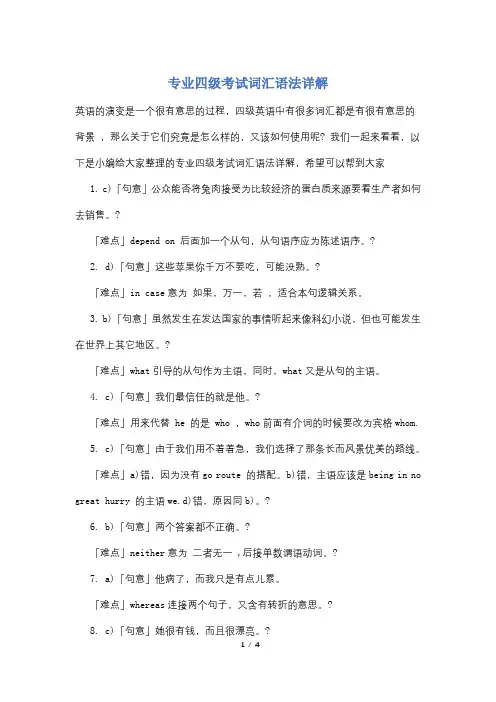
专业四级考试词汇语法详解英语的演变是一个很有意思的过程,四级英语中有很多词汇都是有很有意思的背景,那么关于它们究竟是怎么样的,又该如何使用呢? 我们一起来看看,以下是小编给大家整理的专业四级考试词汇语法详解,希望可以帮到大家1. c)「句意」公众能否将兔肉接受为比较经济的蛋白质来源要看生产者如何去销售。
?「难点」depend on 后面加一个从句,从句语序应为陈述语序。
?2. d)「句意」这些苹果你千万不要吃,可能没熟。
?「难点」in case意为如果,万一,若,适合本句逻辑关系。
3. b)「句意」虽然发生在发达国家的事情听起来像科幻小说,但也可能发生在世界上其它地区。
?「难点」what引导的从句作为主语,同时,what又是从句的主语。
4. c)「句意」我们最信任的就是他。
?「难点」用来代替 he 的是 who ,who前面有介词的时候要改为宾格whom.5. c)「句意」由于我们用不着着急,我们选择了那条长而风景优美的路线。
「难点」a)错,因为没有go route 的搭配。
b)错,主语应该是being in no great hurry 的主语we.d)错,原因同b)。
?6. b)「句意」两个答案都不正确。
?「难点」neither意为二者无一 ,后接单数谓语动词。
?7. a)「句意」他病了,而我只是有点儿累。
「难点」whereas连接两个句子,又含有转折的意思。
?8. c)「句意」她很有钱,而且很漂亮。
?「难点」what is more是习惯用语,意为另外,而且。
?9. d)「句意」不管怎么说,因为你父亲你才有今天。
?「难点」say what you like 意为不管怎么说。
?10. d)「句意」是你铺的床,你就要躺在上面(自作自受)。
?「难点」as so 意为像那样,也就。
?11. c)「句意」如果读书不是为了消磨时间而是为了获取知识,那么你必须积极去读。
?「难点」pass意为消磨 waste意为浪费 spend意为花费 idle意为虚度,与away连用。
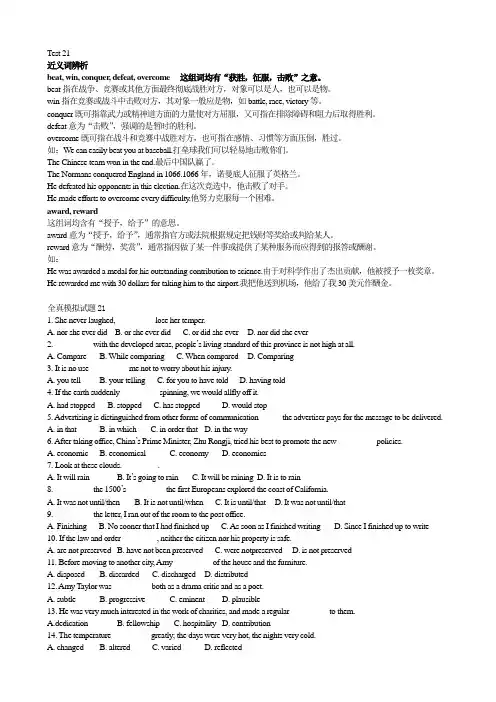
Test 21近义词辨析beat, win, conquer, d efeat, overcome 这组词均有“获胜,征服,击败”之意。
beat指在战争、竞赛或其他方面最终彻底战胜对方,对象可以是人,也可以是物。
wi n指在竞赛或战斗中击败对方,其对象一般应是物,如battle, race, vi ctory等。
conquer既可指靠武力或精神道方面的力量使对方屈服,又可指在排除障碍和阻力后取得胜利。
defeat意为“击败”,强调的是暂时的胜利。
overcome既可指在战斗和竞赛中战胜对方,也可指在感情、习惯等方面压倒,胜过。
如:We can easily beat you at baseball.打垒球我们可以轻易地击败你们。
The Chinese team won in the end.最后中国队赢了。
The Normans conquered England in 1066.1066年,诺曼底人征服了英格兰。
He defeated hi s opponents i n thi s election.在这次竞选中,他击败了对手。
He made efforts to overcome every di ffi cul ty.他努力克服每一个困难。
award, reward这组词均含有“授予,给予”的意思。
award意为“授予,给予”,通常指官方或法院根据规定把钱财等奖给或判给某人。
reward意为“酬劳,奖赏”,通常指因做了某一件事或提供了某种服务而应得到的报答或酬谢。
如:He was awarded a medal for hi s outstanding contributi on to science.由于对科学作出了杰出贡献,他被授予一枚奖章。
He rewarded me with 30 dollars for taki ng him to the airport.我把他送到机场,他给了我30美元作酬金。
英语专业四级考试词汇语法真题参照答案与解析11.Ho.ca..concentrat.i.yo.________.continuall._____.m.wit.sill. questions?A.have.interruptedB.are.interruptedC.had.interruptingD.were.interrupting选A。
虽然我觉得更应当说you are continually interrupting me with silly questions。
不过这里用目前完毕时表达旳是一种动作发生过成为过去经历, 有也许多次发生, 也就是打断一次、两次、三次等等不停反复到目前。
12.Amon.th.fou.sentence.below.Sentenc.__.expresse.th.highes.d egre.o.possibility?A.I.ma.tak..lon.tim.t.fin..solutio.t.th.problem.B.I.migh.tak..lon.tim.t.fin..solutio.t.th.problem.C.I.coul.tak..lon.tim.t.fin..solutio.t.th.problem.D.I.shoul.tak..lon.tim.t.fin..solutio.t.th.problem.选D。
四个里把握度最高旳是should, 另一方面是may, 最终是might和could。
13.Sh.i..bette.speake.tha.____.i.th.class.A.an.boyB.th.othe.boysC.othe.an.girlD.al.th.girls选A。
主语是she, 女旳, 因此不能选B。
C旳对旳说法是any other girl。
14.Nobod.hear.hi.sing.______?A.di.oneB.di.heC.didn’.theyD.di.they选B。
独立主格结构独立主格结构(Independent Genitive)有两部分组成,前一部份是名词或者代词,后一部分是非谓语动词(不定式、动名词和分词)或形容词、副词、或介词短语。
前后两部分具有逻辑主谓关系。
独立主格结构在句中做状语,多用于书面语。
独立主格结构本身不是句子,在句子中作状语,表示时间、原因、条件、伴随、目的等。
非谓语动词作状语,其逻辑主语须与主句主语保持一致。
若不一致,非谓语动词形式须另带主语,从而构成复合结构的形式作状语。
这种结构称为“独立结构”。
其中,非谓语动词主动用现在分词,被动用过去分词。
非谓语动词及其短语前面带有逻辑主语,逻辑主语的代词又是主格,故常称为“独立主格”。
“独立结构”在句中起状语作用,相当于状语从句,表示时间、原因、条件、方式或伴随等情况。
功能独立主格结构主要用于描绘性文字中,其作用相当于一个状语从句,常用来表示时间、原因、条件、行为方式或伴随情况等。
例如:表示时间The meeting being over, all of us went home. 开完会后我们都回家了。
Her work being done, she sat down for a cup of tea. 她干完了活,坐下来喝茶。
表示条件The condition being favorable, he may succeed. 若条件有利,他或许能成功。
表示原因There being no taxis, we had to walk. 没有出租车,我们只好步行。
He wrapped her up with great care, the night being dark and frosty. 夜又黑又冷,所以他把她裹得严严实实的。
表示伴随情况Almost all metals are good conductors, silver being the best of all. 几乎所有的金属都是良导体,而银则是最好的导体。
英语专业四级(专四)词语辨析大全,还挺有用的!abandon, desert, forsake, leave, give up这些动词或词组均含“抛弃、放弃”之意abandon: 强调永远或完全放弃或抛弃人或事物等,这可能是被迫的,也可能是自愿的。
desert: 着重指违背法律责任和义务,或自己的信仰与誓言的行为,多含非难的意味。
forsake: 侧重断绝感情上的依恋,自愿抛弃所喜欢的人或物。
也指抛弃信仰或改掉恶习。
leave: 普通用词,指舍弃某事或某一职业,或终止同一某人的关系,但不涉及动机与果。
give up: 普通用语,侧重指没有希望或因外界压力而放弃。
ability, capacity, capability, genius, talent, competence, faculty, gift, aptitude 这些名词均可表示人的“能力,才能”之意。
ability: 普通用词,指人先天的或学来的各种能力。
capacity: 侧重指人的潜在能力,通常不指体力,多指才智,尤指接受与领悟能力。
capability: 多用于人,指胜任某项具体工作的能力,也指本身具有、尚未发挥的潜在能力。
常与of或for连用。
genius: 语气最强,指天赋的高度才能与智力。
talent: 着重指人某方面具有可发展和倍养的突出天赋才能,但语意比genius弱。
competence: 正式用词,侧重指令人满意的业务能力与水平,达到胜任某项工作等的要求。
faculty: 指特殊的才能或智力。
gift: 着重个人的天赋的才能或在某方面的显著本领,常暗含不能用一般规律作解释的意味。
aptitude: 多指先天或后天习得的运用自如的能力,常暗示接受能力强,能迅速掌握一种学术训练或艺术技巧。
able, capable, competent这些形容词均含有“有能力的,能干的”之意able: 最常用词,多用于褒义,着重指多方面的,经常性的,或潜在性的能力。
高校英语专业四级考试·词汇语法详细解1集体名词作主语主谓一致1)通常作复数的集体名词集体名词,如:police, people,cattle,militia,poultry等,通常作复数,用复数动词。
如:Domestic cattle provide us with milk, beef and hides.2)通常作不可数名词的集体名词有些集体名词,如foliage,machinery,equipment,furniture,merchandise,通常作不可数名词,随后的动词用单数。
例如:All the machinery in the factory is made in China.3)既可作单数也可作复数的集体名词集体名词,如audience, committee, class, crew, family, public, government等,既可作单数,也可作复数用。
The city council is meeting to set its agenda.4)a committee,etc. of +复数名词如果主语是由“a committee of /a panel of /a board of +复数名词”构成,随后的动词通常用单数。
例如:A committee of five men and three women is to consider the matter.近义词辨析tired, exhausted, fatigued, weary, worn out这组词均含有“疲惫的”的意思。
tired可指因体力或脑力消耗太多而需要休息,还可指因长期做某事而失去兴趣。
Henry was so tired that he went to bed immediately after he got home.亨利很疲惫,一到家就上床睡觉去了。
exhausted表达的疲惫程度最强,指因劳累过度而精疲力竭。
Test Twenty Seven近义词辨析recall, remember, remind, recollect这组词都有“(使…)想起”之意。
recall意为“想起”,强调有意识地去“回忆,回想”,常与can, could等词连用,强调一次性回忆。
remember表示“想起”,指事物自然地在记忆中出现,不强调努力或意志。
remind表示“使…想起”,指人受到一定媒介的启发或提醒而慢慢地唤起对往事的记忆,常用在remind sb. of sth.的结构中。
recollect意为“回想”,指把已经遗忘的事情重新想起,强调回忆过程。
I can’t recall having met him before.我记不起以前曾见到过他。
I suddenly remembered I had left the book in the library.我突然想起我把书忘在图书馆了。
Your telling me that story reminds me of another.你给我讲的故事使我想起了另一个故事。
She thought back and tried to recollect the exact wording of the letter.她回忆着,试图回想起那封信的准确字眼。
shift, move, remove, transfer这组词均含有“移动,转移”的意思。
shift含有“轻易地更动”或出于不正当的动机把罪过“转”到他人身上的意思。
move应用范围很广,其中主要意思是“从一处移到另一处”。
remove意为“拿开,移动,消除”,强调离开原来的、正常的地方或职位等做一种新的、有时是暂时的安排或改变。
该词还含有把不利的东西“取消”的意思。
transfer意为“调动,移交”,强调从一处转到另一处。
It’s no use trying to shift the blame to anybody else.想把过错推到别人身上是没用的。
高校英语专业四级考试词汇语法详解
高校英语专业四级考试词汇语法详解
TestEight
Itisthefirsttime+that分句
在“Itis/was/willbethefirsttime+that分句”结构中,当主
句动词为is/willbe时,that分句动词一律用现在完成体,引导词that可以省略。
例如:
ItisthefirsttimeI’vebeenhere.
Don’tforget,it’llbethefirsttimeI’vespokeninpublic.
当主句动词为was时,that分句动词通常用过去完成体。
例如:
Itwasthefirsttimeshe’dbeenatasummerschoolandshethorough lyenjoyedit.
近义词辨析
fast,hasty,quick,rapid,speedy,swift
这组词均含有“迅速的”,“快捷的”的意思。
fast
强调速度快,且保持不变;又指钟表的时间超过准确的'时间。
WetookafasttraintoBeijing.我们坐快车来北京。
hasty
指匆忙、急促,涉及因此而引起的慌乱、疏漏。
Don’tarriveathastyconclusions.别匆忙下结论。
quick
强调动作、行为发生得突然且持续时间短。
指人时,暗示聪明、领悟快。
Thetigertookaquickleapatthesheep.老虎猛地向羊扑去。
rapid
指就整个过程来讲速度快,但并不一定指这一过程的速度始终均匀不变。
Thegrowthoftheeconomyhasbeenrapidinrecentyears.近年来,经济增长速度很快。
speedy
指人处理问题迅速或物体运转速度快。
Hisaccusationsbroughtaspeedydenial.他的指控马上遭到了否认。
swift
与fast和quick同义,但带有文学色彩。
Eaglesareswiftinflight.鹰飞得很快。